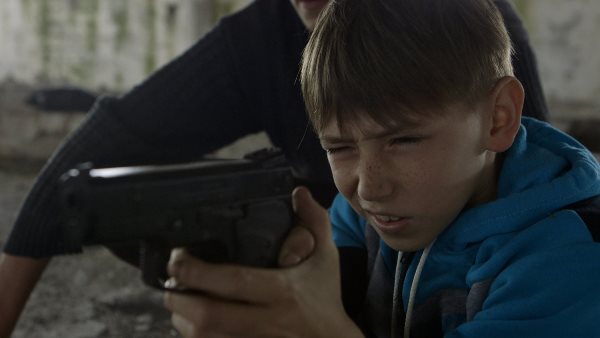![]() It is not uncommon for young boys to wish to be as powerful as their grown-ups counterparts, but such longing takes on a new significance in this powerful vérité documentary, set in a Ukrainian town distressingly close to the war front with Russia. On a near-daily basis, 10-year-old Oleg Afanasyev and his family hear explosives. Somtimes they fall close enough to cause the house to shudder.
It is not uncommon for young boys to wish to be as powerful as their grown-ups counterparts, but such longing takes on a new significance in this powerful vérité documentary, set in a Ukrainian town distressingly close to the war front with Russia. On a near-daily basis, 10-year-old Oleg Afanasyev and his family hear explosives. Somtimes they fall close enough to cause the house to shudder.
Director Simon Lereng Wilmont offers an intimate view, in which the mundane and terrible often co-exist uneasily. At school, there are regular visits from army officers who lecture on how to identify land mines, although one of the more darkly funny sequences involves children taking turns proving how much they already know. Meanwhile, at home, Oleg, along with his younger cousin Yarik, spends countless hours exploring the adjacent wilderness and abandoned buildings nearby.
Despite the signs of war and destruction around them, Oleg and Yarik retain some semblance of a childhood. They find spent bullet casings on the ground, which fill them with fascination and excitement. However, while playing in a bombed-out warehouse, Oleg suffers a cut, which is so tiny that even in a close-up, the camera cannot discern it. From the look on his face, one would think he suffered the most brutal of wounds.
There is plenty of familial warmth, which is largely due to Alexandra, the boys’ grandmother, who is a soothing, maternal presence. She provides an important counterpoint to Oleg and Yarik’s fantasies of adventure, constantly reminding them of the importance of a warm home and loving family. Gradually, we see just how profound an influence she has on Oleg, who starts to reveal his nurturing side when Alexandra becomes unwell.
Any sentimentality is fleeting, as we are constantly reminded of the horrors of war, mostly through disturbing footage, including of homes on fire as a result of the nearby shelling. Lereng Wilmont cuts to projectiles streaking across the night sky, which is both haunting and strangely beautiful. We also see the conflict through the increasingly stressed-out point of view of Alexandra, who attempts to conceal her worries. At one point, when the explosions seem particularly close by, she takes up cleaning the house, which she later confesses is so the children do not see her hands trembling.
There are occasional moments that offer hope, such as when Yarik’s mother gets involved with a soldier in the Ukrainian army, bringing a chance for the pair to go away. Yet as the film counts down the days until Yarik is set to leave, he has developed such a close bond with Oleg and Alexandra that it’s painful to see him depart. Yarik might feel the same way as he starts to act coldly toward his loved ones; it’s a no-win situation for everyone.
Despite the influence of Alexandra, Oleg still believes that there is a certain paradigm of masculinity he must live up to. Hence, he enjoys hanging out with a teenage boy from nearby Kostya and remarks to him, “We’re men, we have to be able to endure everything,” as the latter tries to console him regarding his cousin’s departure. This leads Oleg trying to impress the older boy through rash displays of machismo: he goes along for a night swim while bombs are buzzing overhead. In a highly suspenseful sequence, Lereng Wilmont keeps the camera trained on Oleg’s face as he tries to ignore his growing fears.
By filming Oleg at regular intervals over the course of a year and a half, Lereng Wilmont captures him gradually becoming more conflicted as his boyish fantasies of playing soldier clash with the harsh reality of what guns are capable of. This story line culminates in his aiming a pistol at a living creature for the first time.
At the film’s New York City premiere, the filmmakers discussed how they purposefully avoided making the film too political, and indeed, there is only brief mention of Russian President Vladimir Putin. (This is certainly a less politically incendiary documentary compared to, say, last year’s Battle for Ukraine.) However, the narrative touches on the potential hazards of being located close to the Russian border and the attempt to move elsewhere, as some Ukrainians are suspicious of those who speak Russian. Ironically, there are times in which living under constant bombing threats still seems like the safest option.
Shortlisted for last year’s Oscar race for Best Documentary Feature, The Distant Barking of Dogs vividly presents life near a heavy military conflict through a humanized lens.
The Distant Barking of Dogs premieres on August 5 as part of PBS’s POV series.

















Leave A Comment